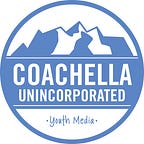Growing up Black and Latino in the Eastern Coachella Valley
One young person’s experience as a biracial teenager in a rural, largely Latino community.
By Paulina Rojas / Coachella Unincorporated
Editor’s Note: The Eastern Coachella Valley (ECV) is home to a strong and vibrant Mexican and Mexican-American community. But for Eeron “EJ” Wilson, a 16-year-old ECV resident, being a biracial, half Mexican and half African-American, young person can be challenging and sometimes isolating. Recently, Wilson sat down with Paulina Rojas, Coachella Uninc.’s Program Associate and Reporter, to share his experience growing up in a largely Latino community and to share how he thinks the Latino community can do more to celebrate and support the Black community.
What was it like for you to grow up in the Eastern Coachella Valley as a biracial, Latino and Black, young person?
“I remember associating more with Latinos and Latinas as a kid, even when I was going into middle school, because that’s mostly who was around me. I believe that I was more in tune with that race until I hit about my eighth grade year. That’s when things began to change.”
What started to change for you at that time?
“My father, who is African-American, informed me about history and told me, ‘Hey there’s barriers between different races.’ [He said] even though we are equal, none of us are the same. I mean, I don’t have the same privileges as a Caucasian American or as someone who is fully Latino. For the untrained eye, most people just see my sister and me as African-American. In the eighth grade I realized that’s all people would see me as until they really got to know me.”
Do people ever ask you questions when they see you with your mom, who is Mexican?
“A lot of people [ask questions] when I tell them that my mom is Mexican or Latina. [They] are like ‘What?’ They are blown away or surprised. It is rare to see a half black, half Latino person [in the Eastern Coachella Valley.] When people see my mom and then they see me, it not only confuses them but it really makes them think.”
Why is it important for people from the Eastern Coachella Valley to celebrate Black History Month and stand in solidarity with the African-American community?
“I feel that it is important for us to really look into Black history to understand all the wonderful things African-Americans have done. African-American people have made a great impact on this nation. Take this into consideration. Did you know that African-Americans have served in every single United States war, even when they were being discriminated against?”
What do you want the people of the Eastern Coachella Valley to know about growing up Black and Latino in this community?
“It is hard. Latinos here are in an environment where they see a lot of their own [people] and they are able to speak and communicate with each other. African-Americans in this community don’t get that luxury. We kind of feel isolated and stranded but we just want Latinos to make us feel comfortable. To be completely honest, accepting people is all we can do. We are all here to try and make it. We are all here to achieve some kind of American dream and if we all stand together, that’s what we can do.”
“We are all here to achieve some kind of American dream and if we all stand together, that’s what we can do.”
About the Author:
Paulina Rojas is a native New Yorker, Paulina has spent the past two years reporting on the Eastern Coachella Valley. She joined Coachella Unincorporated in 2016. While it is different from the concrete jungle of Manhattan, she feels right at home in Coachella. In 2014 Paulinagraduated with a journalism degree from The University of Houston and is a member of The National Association of Hispanic Journalists. View her author page here.
